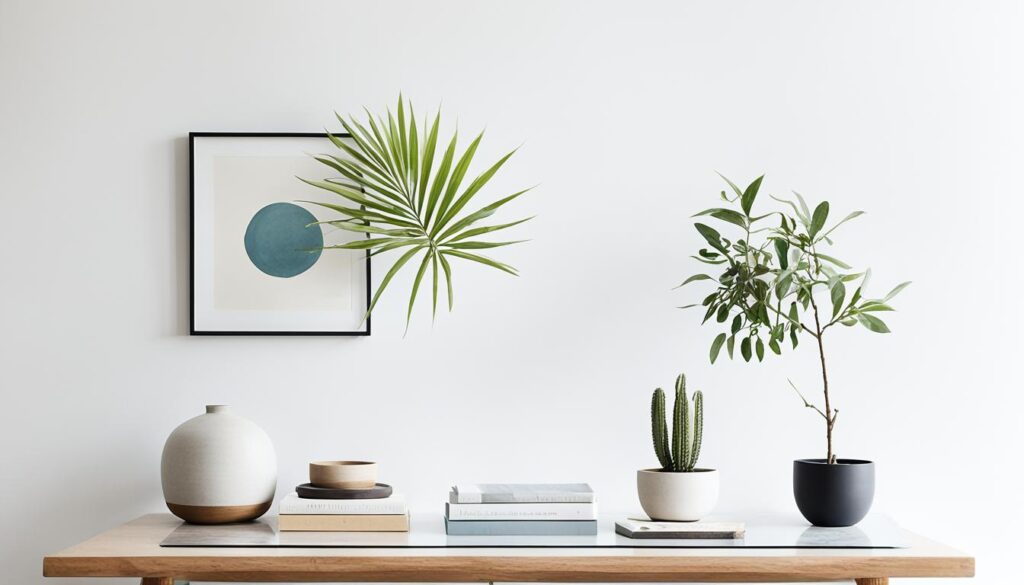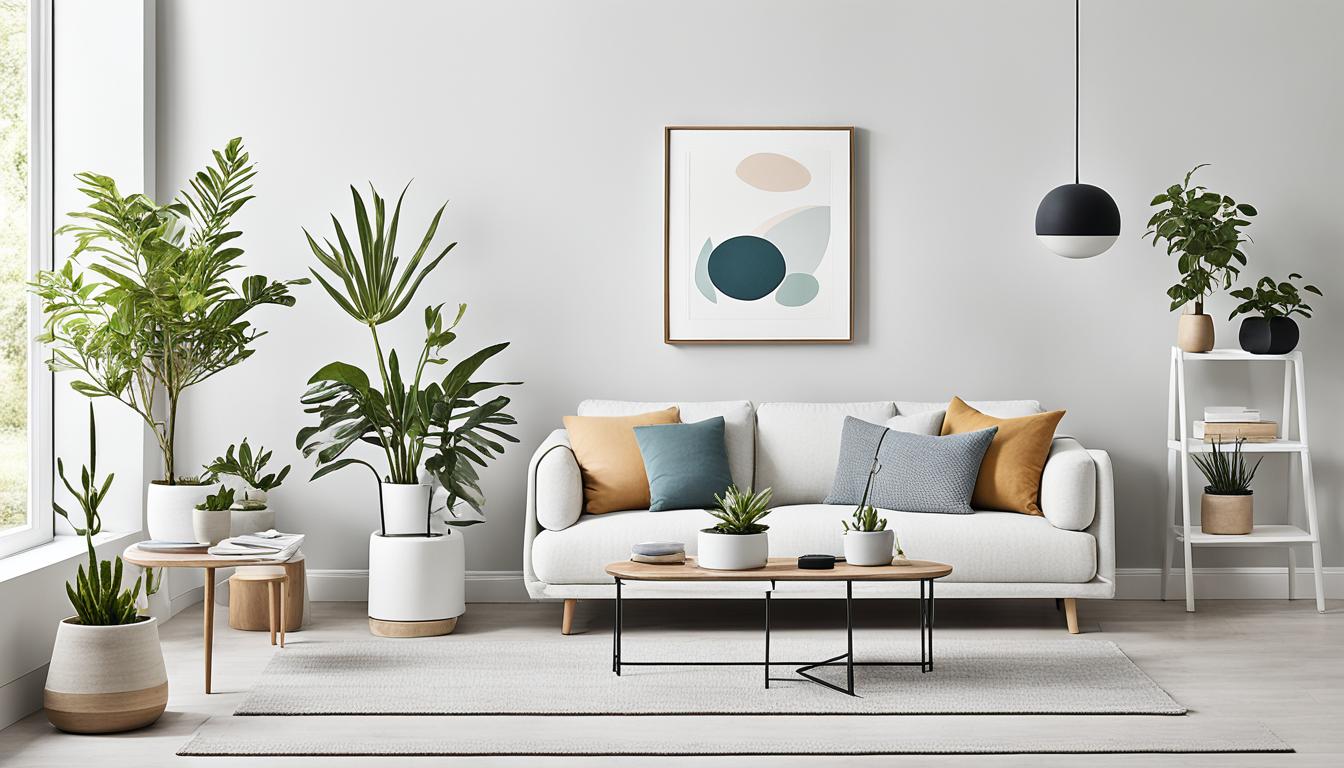Welcome to the world of minimalist living! If you’re looking to simplify your life, declutter your space, and embrace a more intentional way of living, you’ve come to the right place. Minimalism is not just about getting rid of things; it’s about making conscious choices, prioritizing what truly matters to you, and creating a life that is aligned with your values and goals.
In this article, we will explore practical tips and strategies for incorporating minimalism into your everyday life. From decluttering your home to adopting a minimalist mindset, you’ll discover how to create a simplified lifestyle that brings you joy and peace. Whether you’re a beginner or already familiar with minimalism, there’s something here for everyone.
Key Takeaways:
- Start small and declutter gradually
- Determine your necessities and let go of excess belongings
- Avoid unnecessary shopping and focus on experiences
- Create a capsule wardrobe for a streamlined style
- Embrace digital solutions and reduce physical clutter
How to Become a Minimalist
Becoming a minimalist is a journey towards a simplified and intentional lifestyle. It begins with finding your “why” and understanding the motivation behind embracing minimalism. By starting small and setting achievable goals, you can avoid overwhelming yourself and make steady progress towards living with less. Here are some practical tips to help you on your minimalist journey:
- Determine Your Necessities: Take a careful look at your everyday life and identify the truly essential items. Declutter and let go of the things that no longer serve a purpose, creating more space and clarity in your surroundings.
- Avoid Unnecessary Shopping: Practice mindful consumption by refraining from impulse purchases and only buying what you genuinely need. Consider secondhand options for items you require, contributing to a more sustainable lifestyle as well.
- Create a Focused Budget: Establish a budget that aligns with your minimalist goals. Prioritize experiences over material possessions, allocating your resources towards activities and experiences that bring you joy and fulfilment.
- Practice Gratitude: Cultivate a sense of gratitude for the things you already have. Acknowledge the value of simplicity and appreciate the abundance that can be found in living with less.
- Adopt Mindfulness: Embrace mindfulness as a way of staying present and intentional in your daily life. Slow down, appreciate the little things, and make conscious choices that align with your minimalist values.
Remember, becoming a minimalist is not about rigid rules or depriving yourself, but about finding freedom and contentment in a life focused on what truly matters. Embrace these ideas and tailor them to suit your unique journey.
“Minimalism is not about deprivation, it is about creating space for the things that truly matter.” – Joshua Becker
The Benefits of Minimalism
Minimalism offers a range of benefits that can transform your lifestyle and positively impact various aspects of your life. By intentionally choosing what you own and adopting a minimalist mindset, you can experience financial advantages, improvements in mental health, and create an aesthetically pleasing living environment.
One of the significant benefits of minimalism is the financial advantage it brings. By consciously deciding what you truly need and avoiding unnecessary purchases, you can save money and reduce financial stress. Instead of accumulating objects, you focus on investing in experiences and meaningful items, which can contribute to long-term financial stability.
“Minimalism is the intentional promotion of the things we most value and the removal of anything that distracts us from it.” – Joshua Becker
In addition to financial benefits, minimalism also promotes improvements in mental health. Living with less clutter can reduce stress and create a sense of calm in your surroundings. As you eliminate excess possessions, you free up mental space and allow yourself to focus on what truly matters. The intentional choices that come with minimalism can lead to increased clarity, mindfulness, and overall well-being.
A minimalist lifestyle also contributes to creating an aesthetically pleasing living environment. By decluttering and organizing your belongings, you can transform your space into an orderly and visually appealing sanctuary. Minimalism emphasizes simplicity and balance, allowing you to curate your environment to reflect your tastes and preferences.
Creating a visually appealing living environment leads to a sense of harmony and peace. When your surroundings are free from unnecessary distractions, you can fully appreciate the beauty and tranquillity of your space. This can promote relaxation and boost your overall mood and well-being.
By embracing minimalism, you not only benefit yourself but also contribute to a more sustainable and intentional way of living. With a focus on intentional choices and the elimination of excess, minimalism aligns with the principles of conscious consumption, reducing waste, and protecting the environment.
Key Benefits of Minimalism:
- Financial advantages and reduced financial stress
- Improved mental health and decreased stress levels
- An aesthetically pleasing and visually appealing living environment
- Contribution to a more sustainable and intentional way of living
Embracing minimalism can bring numerous benefits into your life, from achieving financial freedom to cultivating a more peaceful and aesthetically pleasing living environment. By intentionally choosing what you own and adopting a minimalist mindset, you can elevate your lifestyle and experience the joys and rewards that come with intentional living.
| Benefits of Minimalism | Financial Advantages | Improved Mental Health | Aesthetically Pleasing Living Environment | Sustainability |
|---|---|---|---|---|
| Saves money and reduces financial stress | Reduces stress and creates a sense of calm | Transforms space into an orderly and visually appealing sanctuary | Aligns with the principles of conscious consumption and waste reduction | |
| Encourages investment in experiences and meaningful items | Leads to increased clarity and mindfulness | Promotes relaxation and boosts overall mood and well-being | Contributes to a more sustainable and intentional way of living |

Practical Tips for Sustaining Minimalism
Sustaining a minimalist lifestyle requires consistent effort and intentionality. Here are some practical tips to help you maintain minimalism and embrace intentional living:
- Set Clear Boundaries: Define what enters your space by establishing clear boundaries. This will help you prevent unnecessary items from cluttering your living environment.
- Embrace Empty Spaces: Don’t feel the need to fill every corner of your home. Embracing empty spaces creates a sense of tranquillity and visual calmness.
- Declutter as You Go: Rather than waiting for a major decluttering session, make decluttering a habit. Regularly assess your belongings and let go of items you no longer need or cherish.
- Buy Experiences, Not Things: Instead of focusing on accumulating material possessions, invest in experiences. Create lasting memories through travel, adventures, and quality time with loved ones.
- Keep a Gratitude Journal: Cultivate a mindset of gratitude by recording the things you are thankful for in a journal. This practice helps shift your focus to appreciate what you already have.
- Experiment with Time-Limited Challenges: Challenge yourself to live with fewer belongings for a set period. This allows you to experience the benefits of minimalism firsthand and discover what truly matters to you.
- Reflect Regularly on the Benefits: Take moments to reflect on the positive aspects of minimalism. Remind yourself of the financial savings, reduced stress, and enhanced well-being that come with intentional living.
- Implement Clutter-Free Habits: Integrate clutter-free habits into your daily routine. Put items back in their designated places, avoid impulse buying, and regularly reassess your possessions.
- Find Consistent Minimalist Inspiration: Surround yourself with sources of inspiration that reinforce your minimalist lifestyle. This can include books, podcasts, blogs, or social media accounts with content that aligns with your values.
By following these decluttering strategies and intentional living tips, you can sustain a minimalist lifestyle and continue to experience the benefits it offers.
Minimalism and Sustainability
Minimalism and sustainability are two concepts that align harmoniously with each other. By embracing a minimalist lifestyle, you can actively contribute to a more sustainable way of living. By reducing your possessions and avoiding excessive consumption, you are minimizing your impact on the environment and promoting a more intentional approach to life.
- Choose sustainable items: When making purchases, opt for products that are eco-friendly and responsibly made. By supporting companies that prioritize sustainability, you are encouraging more conscious practices and reducing your carbon footprint.
- Build a capsule wardrobe: A capsule wardrobe consists of a small collection of versatile clothing items that can be mixed and matched effortlessly. By cultivating a minimalist wardrobe, you can reduce textile waste and make more mindful fashion choices.
By prioritizing quality over quantity, you can significantly reduce waste and contribute to a more eco-friendly approach to living. Instead of accumulating unnecessary items, focus on investing in high-quality, durable products that will last longer. This intentional mindset helps minimize the strain on natural resources and promotes sustainable consumption.
“The greatest threat to our planet is the belief that someone else will save it.” – Robert Swan
A minimalist lifestyle encourages mindful consumption. By being more conscious of your choices and only buying what you truly need, you can reduce waste and minimize your impact on the environment. This intentional approach to living fosters a deeper connection with the items you own and encourages responsible decision-making.
Conclusion
Congratulations on your journey towards embracing a minimalist lifestyle! By implementing the minimalist living tips and simple living advice mentioned in this article, you are on your way to experiencing the joys and freedom that minimalist living has to offer.
Remember, minimalism is a commitment that requires intentionality. Start small by decluttering one area at a time and gradually expand your efforts. Find your motivation, whether it’s reducing stress, saving money, or creating a more aesthetically pleasing living environment.
Keep in mind the many benefits of minimalism. By consciously choosing what enters your space and avoiding unnecessary purchases, you can enjoy financial savings and improved mental health. As you embrace minimalism, you’ll create an orderly and visually appealing home environment that promotes a sense of calm and well-being.
With consistent effort and focus, you have the power to shape your life in a way that aligns with your values. Say goodbye to clutter and unnecessary distractions, and open the door to a simpler, more meaningful existence. Embrace the minimalist lifestyle and let it guide you towards a happier, more fulfilled life.
FAQ
What is minimalism?
Minimalism is a lifestyle that emphasizes simplicity and the elimination of excess. It involves intentionally choosing what you own and living with only the essentials.
How do I become a minimalist?
To become a minimalist, start by finding your “why” – the motivation behind wanting to embrace a simplified lifestyle. Start small by decluttering and setting achievable goals. Determine what items are necessary in your everyday life and declutter accordingly.
What are the benefits of minimalism?
Minimalism offers various benefits such as reducing stress, saving money, and creating a more aesthetically pleasing living environment. It can lead to financial advantages, improvements in mental health, and a clutter-free home.
How do I sustain a minimalist lifestyle?
Sustaining a minimalist lifestyle requires consistent effort and intentionality. Set clear boundaries for what enters your space and embrace empty spaces. Declutter as you go and prioritize experiences over material possessions.
How does minimalism align with sustainability?
Minimalism promotes sustainability by reducing excessive consumption and waste. By choosing sustainable items, building a capsule wardrobe, and practising mindful consumption, you can contribute to a more eco-friendly lifestyle.





